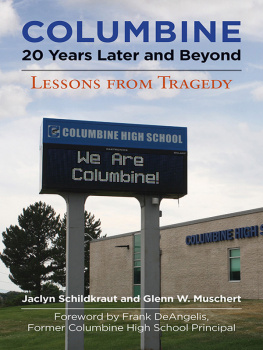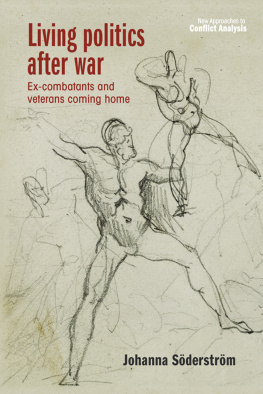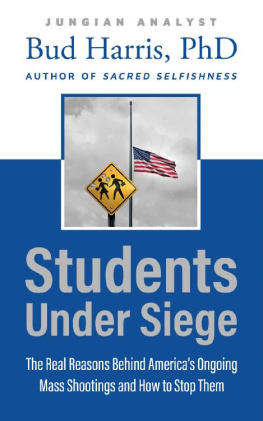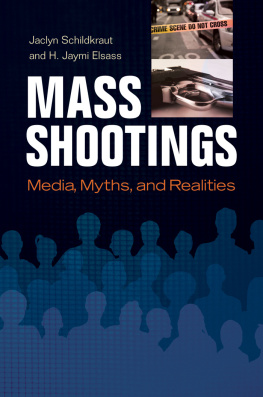
This volume firmly establishes Johanna Nurmi as an influential researcher in the social sciences, especially within scholarly discussions about trauma, mass violence, and community. While the discussion is solidly sociological, it will appeal to broader interests such as community studies, cultural studies of violence, social work, and traumatology. At heart, this book is an effort to understand community and social responses to two school rampage attacks in Finland (i.e., Jokela and Kauhajoki), although the international relevance quickly becomes apparent. The topic of this research is of a very sensitive emotional nature, not only with regards to the individuals and communities affected by tragic violence, but also with regards to the emotional toll such work has on the researcher herself. For its sensitivity to the communities studied, this work stands out as recognizing the human effects of tragedy, while pressing for rigorous insight into such effects.
Glenn Muschert, Professor of Sociology and Social Justice Studies Miami University, Ohio, USA
Shared Experiences of Mass Shootings is an enlightening and innovative analysis of the cultural trauma ofmass shootings and how communities are affected in their aftermath. As the first monograph to approach mass shootings from an international-comparative perspective with profound insight into the Finnish context and experience with this devastating social problem, Dr. Nurmi has made an extremely important contribution to the field.
Eric Madfis, Associate Professor of Criminal Justice, University of Washington, Tacoma, USA
Johanna Nurmis Shared Experiences of Mass Shootings is a powerful and much-needed analysis of how mass shootings affect the communities in which they occur and how gender and gender roles help shape the processes of grief and recovery communities experience. While primarily focused on two tragic Finnish cases, Nurmis insights are more universal: collective traumas simultaneously unite communities in solidarity and divide them in conflict.
James Hawdon, Director of the Center for Peace Studies and Violence Prevention, Virginia Tech, USA
Shared Experiences of Mass Shootings
Mass violence and terrorism are salient phenomena in late modern society, showing no sign of decline. Proactive results from the long, ongoing debate of how to address these issues are therefore increasingly necessary-not just in the context of prevention, but also in the context of the aftermath.
Shared Experiences of Mass Shootings develops an understanding of the collective experience, consequences and recovery processes after mass shootings. Drawing from in-depth case studies of two mass shootings in Finland and comparing them with other international cases, it explores how communities work through violent tragedies, employing social memory and memorialization practices that can be seen as either tools for recovery or as something that needs to be restricted.
Contributing a novel understanding of how experiencing mass violence is deeply gendered through the social patterns and narratives of mens and womens emotions, this timely monograph will appeal to undergraduate and postgraduate students, as well as postdoctoral researchers, interested in fields such as: Sociology of Violence, Criminology, Social Work, Memory Studies, Media Studies, and Cultural Trauma.
Johanna Nurmi is a postdoctoral researcher at the University of Turku, Finland.
Routledge Advances in Sociology
Transnational Students and Mobility
Lived Experiences of Migration
Hannah Soong
Aging in Contexts of Migration
Edited by Ute Karl and Sandra Torres
Twentieth Century Population Thinking
A Critical Reader of Primary Sources
Edited by Population Knowledge Network
The Synchronization of National Policies
Ethnography of the Global Tribe of Moderns
Pertti Alasuutari
Retail and the Artifice of Social Change
Steven Miles
Theorizing Social Memories
Concepts and Contexts
Edited by Gerd Sebald and Jatin Wagle
Addiction, Modernity, and the City
A Users Guide to Urban Space
Christopher B.R. Smith
Medicine, Risk, Discourse and Power
Edited by John Martyn Chamberlain
Pragmatic Humanism
On the Nature and Value of Sociological Knowledge
Marcus Morgan
Shared Experiences of Mass Shootings
A Comparative Perspective on the Aftermath
Johanna Nurmi
Shared Experiences of Mass Shootings
A Comparative Perspective on the Aftermath
Johanna Nurmi
First published 2018
by Routledge
2 Park Square, Milton Park, Abingdon, Oxon, OX14 4RN
and by Routledge
711 Third Avenue, New York, NY 10017
Routledge is an imprint of the Taylor & Francis Group, an informa business
2018 Johanna Nurmi
The right of Johanna Nurmi to be identified as author of this work has been asserted by her in accordance with sections 77 and 78 of the Copyright, Designs and Patents Act 1988.
All rights reserved. No part of this book may be reprinted or reproduced or utilised in any form or by any electronic, mechanical, or other means, now known or hereafter invented, including photocopying and recording, or in any information storage or retrieval system, without permission in writing from the publishers.
Trademark notice: Product or corporate names may be trademarks or registered trademarks, and are used only for identification and explanation without intent to infringe.
British Library Cataloguing in Publication Data
A catalogue record for this book is available from the British Library
Library of Congress Cataloging in Publication Data
A catalog record for this book has been requested
ISBN: 9781138217393 (hbk)
ISBN: 9781315440682 (ebk)
I want to begin by offering my gratitude to the residents of the Finnish towns of Jokela and Kauhajoki who made this study possible. Thank you for being so open and willing to share your experiences. I hope my interpretations do justice to your stories.
This book is based on my doctoral dissertation, conducted under the guidance of Pekka Rsnen and Anu-Hanna Anttila. I am beyond grateful to them and everyone else who inspired and guided me throughout the process of writing the dissertation which eventually led to this book. Advice from Glenn Muschert, Suvi Salmenniemi, Olli Pyyhtinen, and James Hawdon also helped a great deal in getting this book startedthank you so much. Parts of this volume are drawn from my previous work co-authored with Atte Oksanen and Pekka Rsnen, and I thank them for sharing their expertise in the process of writing those articles. Thank you also to Miika Vuori and Kauri Lindstrm for help in conducting the interviews used in this book.
I want to thank my colleagues in the Social Research Department at the University of Turku for supporting my work in numerous ways. My co-workers in the research project Tracking the Therapeutic: Ethnographies of Wellbeing, Politics and InequalityHarley Bergroth, Laura Kemppainen, Inna Perheentupa, and Tatiana Tiaynen-Qadirand the project leader, Suvi Salmenniemi, deserve a special mention. Many thanks also to Paul Jonker-Hoffrn, Mari Toivanen, Carita Lockmer, Salla Sariola, Pivi Naumanen, Jukka Vuorinen, and Kaiju Harinen for inspiring conversations that have all contributed to this work.












